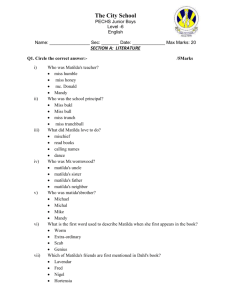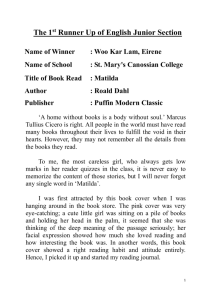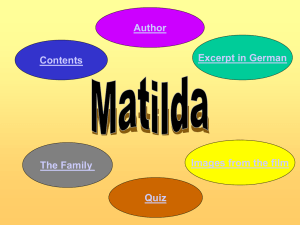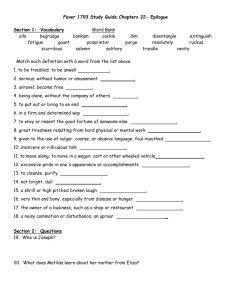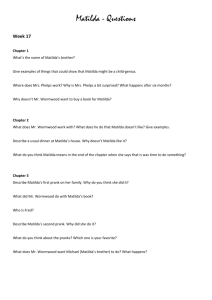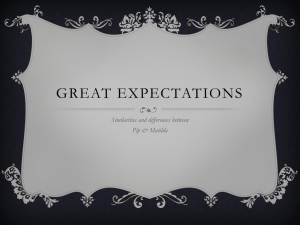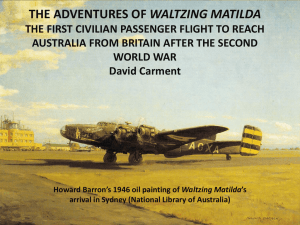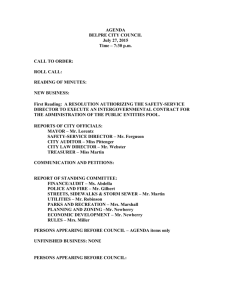Read the notes - Matilda The Musical
advertisement
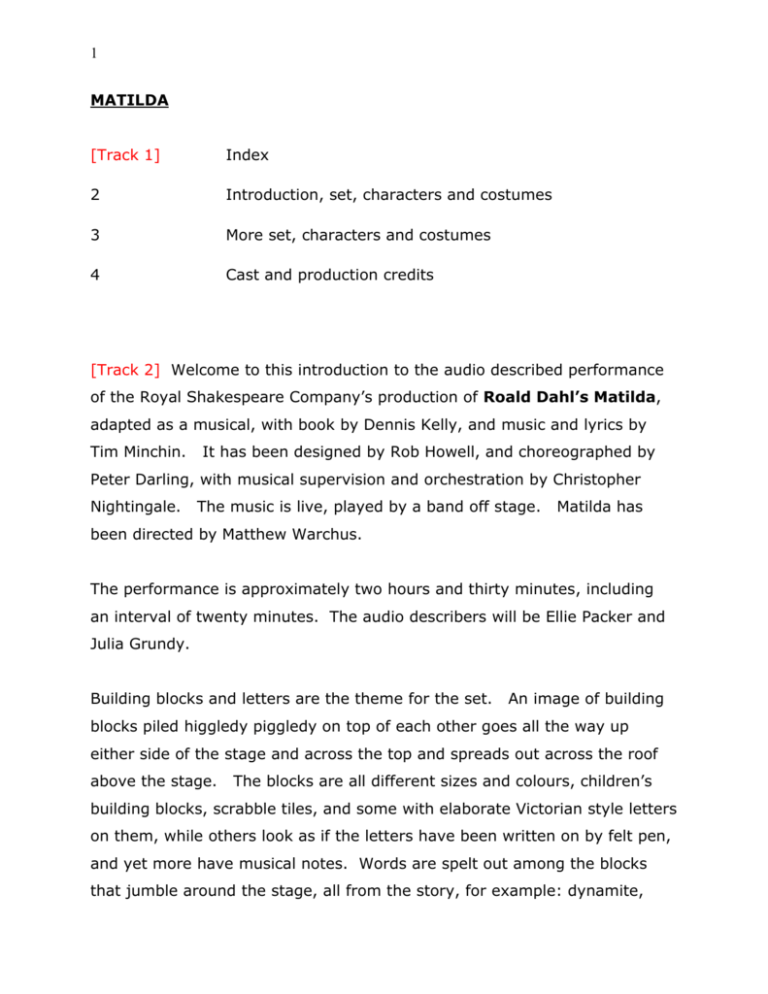
1 MATILDA [Track 1] Index 2 Introduction, set, characters and costumes 3 More set, characters and costumes 4 Cast and production credits [Track 2] Welcome to this introduction to the audio described performance of the Royal Shakespeare Company’s production of Roald Dahl’s Matilda, adapted as a musical, with book by Dennis Kelly, and music and lyrics by Tim Minchin. It has been designed by Rob Howell, and choreographed by Peter Darling, with musical supervision and orchestration by Christopher Nightingale. The music is live, played by a band off stage. Matilda has been directed by Matthew Warchus. The performance is approximately two hours and thirty minutes, including an interval of twenty minutes. The audio describers will be Ellie Packer and Julia Grundy. Building blocks and letters are the theme for the set. An image of building blocks piled higgledy piggledy on top of each other goes all the way up either side of the stage and across the top and spreads out across the roof above the stage. The blocks are all different sizes and colours, children’s building blocks, scrabble tiles, and some with elaborate Victorian style letters on them, while others look as if the letters have been written on by felt pen, and yet more have musical notes. Words are spelt out among the blocks that jumble around the stage, all from the story, for example: dynamite, 2 atmosphere, escape, shiny, acrobat, phenomenon and dangerous. As we enter the auditorium, the name Matilda is spelt out in brightly lit letter blocks, hanging at different heights, just above the stage. The actors in the story come onto the stage from the sides at the back, and up onto the front of the stage along the aisle through the middle of the audience. The back wall of the stage and the floor look as if they are made from blue square blocks of wood fitted neatly together. Some of the squares in the back wall can open up to be windows. Dotted around the floor, a few of the squares are coloured and have letters on them. There are also trapdoors around the stage floor – sometimes school desks and seats rise up through them, and other little ones can be opened up as cubby holes to store things in. The scenery at the back of the stage is mainly painted onto flat cutouts, which slide in. Just like the floor and back walls the theme is little box like shapes piled on top of one another in crooked heaps. At the start of the show, the image is of piles of little boxes, like crazy bookshelves, each box filled with the brightly coloured backs of books. Sometimes pieces of furniture or props are brought on to make different places in the story. At the start of the show there are two long tables covered with white tablecloths decorated with lots of little black letters; they can be either party tables, or a hospital bed. There is also a green canvas surgical screen from a hospital that is wheeled on. Later in the story four rope swings with wooden seats lower down above the front of the stage. They can swing out over the front rows of the audience. The costume designs brilliantly recreate the drawings in Roald Dahl’s original 3 book, which were drawn by the illustrator Quentin Blake. MATILDA WORMWOOD, our heroine, a marvellously clever little five-yearold girl, lives at home with her parents and older brother Michael, in a small town. Despite her young age and small size, and the lack of interest shown in her by her parents, Matilda is an impressively composed little person, serenely confident in her own abilities, and not really aware of how unusual she is. She has a sweet round face and long hair. At first dressed in a plain cotton frock and start-rite sandals, she soon goes to school and is then always dressed in the Crunchem Hall uniform along with the other first years. Her parents, Mr and Mrs Wormwood, in their late thirties, are equally tall, thin and active, with hard, suspicious faces and sharp, angular bodies. MR. WORMWOOD, a used-car salesman, is dressed in a green and black checked suit of spectacular loudness, worn with an electric blue waistcoat trimmed with the same check over a white shirt and checked tie. His socks, and the lining of the suit jacket, are of the same, vibrant, blue. Caramelcoloured winkle-picker shoes complete the wide-boy look. Gold cufflinks and signet ring, and a diamond stud in his left ear, glint as they catch the light. Mr. Wormwood’s hair is teased into a high quiff, and this, together with his beady eyes, pointy nose and droopy moustache, give him the appearance of a wary rodent. MRS. WORMWOOD’S love of Italian and Spanish dancing is reflected in her clothes. She wears a flounced, flowery blouse in shocking pink and bright blue silk, with a long, sparkly, purple skirt which is slit to mid-thigh revealing her long, slim legs encased in shiny, pink tights. Her high-heeled bright blue shoes, with strap across the instep, make her legs look even longer. The 4 skirt can be whipped off, for the more energetic dances, to reveal a fringed, micro-mini skirt with large pink hearts at front and back. Mrs. Wormwood’s hair style is the most noticeable aspect of her appearance. Platinum blonde, but with very dark roots, it is teased into a thousand curls and piled into an impossibly high tower on top of her head, with a cascade of ringlets falling over one shoulder. She is a good-looking woman but the selfishness of her character rather spoils the charm of her face. MICHAEL WORMWOOD is Matilda’s older brother. A lazy, gormless youth, he spends most of his time slumped in an armchair, eyes glued on the TV. Although plainly his parents’ favourite, he has a vacant expression and is always the last to catch on. He wears droopy jeans and a red, hooded sweatshirt with the word ‘GENIUS’ in white across the chest. A yellow, baseball cap, worn the wrong way round, covers his lank, brown hair. The Wormwoods’ Sitting Room has a back wall made again from a ramshackle pile of blocks, this time each block is covered with green patterned wallpaper. At the bottom grey stone blocks make a frame for the fireplace, and the black blocks in the middle of the fireplace have the word SOOT written across them, as if on a blackboard. Three really large plastic ducks are fixed to the wall as if flying upwards, and they are above a portrait of a lady’s face done out in different, bright colours. The mantelpiece across the fireplace is crammed with things; fluffy souvenirs from holidays, models of Spanish dancing ladies and brightly coloured plastic flowers. On either side of the room are two bright orange armchairs. Facing them, at the front of the stage, is a big old-fashioned TV set, placed on a fluffy lime green rug. 5 In contrast Matilda’s Room is decorated in nice peaceful shades of blue – plain blue squares for the wall, a matching blue bed with same coloured covers set end on, with a blue bedside table on the left, with a small lamp on it. There is a shelf on the wall above the bed, sturdy enough for Matilda to sit on, but it also contains a row of white books. The back of each book contains a letter; all together the letters spell out the words ‘library books’. Later there is a pop up wall at the front, made from a frame of squares, the lower ones covered in peeling wood effect wallpaper, the higher ones see through. The word His is on the right hand side, hers on the left. This is the scruffy wall of the Wormwood’s bathroom. [Track 3] RUDOLPHO, is Mrs. Wormwood’s dancing partner. His slender figure is poured into skin-tight, black, leather trousers, their wide flares studded with glittering rhinestones. His long sleeved black shirt is similarly close-fitting and reveals all his smooth chest with its heavy gold medallion and chain. His long, dark hair flows to his shoulders and he is clean-shaven except for razored, wedge-shaped sideburns just below his cheekbones. MRS. PHELPS is the kindly librarian who first encourages Matilda in her love of reading. She is a comfortably round black woman in her forties with the kind face of a good listener. She is bundled up in multi-coloured layers of patterned clothes, topped with a cosy cardigan. Her mass of corkscrew curls, threaded with beads, is held back from her face with a wide paisley scarf. Her long, dangly earrings sometimes catch on the beads in her hair. She has several strings of gleaming, round, silk beads hanging about her neck. Mrs. Phelps pads around her library in ankle socks and converse trainers, pushing a metal trolley of books to be shelved, but she is always ready to pull up a seat and listen to Matilda’s stories. 6 In the library, more tall shelves, and all full of books, are slid across the back. Amongst the books are big letters spelling out the words ‘HUSH’, ‘ SILENCE’, and ‘QUIET’. Big wooden blocks with letters on them are used as seats. Matilda tells stories to Mrs Phelps; at first she uses two ragdoll puppets about 30 cm tall, to act out her tale, later her characters come to life as she tells her story. THE ESCAPOLOGIST, is a circus performer in a red leotard over a sparkling, white body suit. Over this goes a dazzling, gold lame cloak and a glittering, red, top hat. He also wears a distinctive white silk scarf with silver embroidery, a gift from his beloved wife. The Escapologist’s wife is THE ACROBAT, a tall, dark, beautiful girl. Her performance costume is of flame coloured satin and she wears a spectacular headdress composed of sparkling sticks of dynamite amid flame-coloured ostrich feathers. Another visitor to the library is MISS HONEY who is soon to become Matilda’s form teacher at Crunchem Hall. Miss Honey lives up to her name with her smooth, shiny, honey-coloured hair falling straight from its side parting to below her shoulders. Of medium height, she is slim and pretty with large, blue eyes. Her modest, retiring character is expressed in her quiet clothes, a knee-length flower-print dress, pale pink tights and a fluffy, pink cardigan. She often wears round, gold-rimmed spectacles which she has on a cord round her neck. Miss Honey’s home is nothing but a rundown hut. It is set on a platform about three metres square, raised off the stage by about half a metre. The only furniture is a single electric cooking ring and some old wooden crates 7 for tables and chairs, and her bed is a mattress on the floor. Behind the house, across the back of the stage, a wall of blocks stretches across with the image of the ramshackle brown clapperboard hut on top in front of more blocks and a white fence running through a meadow of bright green grass filled with colourful flowers. Miss Honey is easily bullied by MISS TRUNCHBULL, the all-powerful headmistress of Crunchem Hall. Played by a man, she is an alarming figure with a curious, hunched posture giving her a predatory look as she looms over the tiny, first-year pupils. Her outfit accentuates this threatening effect, emphasising the massive torso and shoulders developed in her years as an Olympic-medal-winning hammer-thrower. She wears a long-sleeved brown smock of thick, stiff, oiled cotton, like Barbour jacket material, clasped at her thick waist with a wide leather belt, and reaching to just above her knees. Under this is a white shirt, fastened at the neck with a silk bow, and tight, knee-breeches of the same heavy cotton as the smock. Long, ribbed, wool socks with turn-over tops reach up to her knees which gleam, bare and spookily white, between socks and smock. Her shoes are man-size flat, brown leather brogues with fringed flaps over the laces. Miss Trunchbull’s iron-grey hair is scraped back into a tight bun, revealing all of her round, scrubbed, red face, which flushes a deeper colour during her frequent rages. Her deep-set eyes are full of suspicion and her jutting chin seems to express her aggressive, obstinate personality. She has a whistle on a cord round her neck, which she often blows shrilly. When leading a PE class, she appears in a very short, pleated grey skirt and hooded sweatshirt with ‘TRUNCH’ on the back in large, white letters and lots of badges sewn onto both sleeves. Her Olympic medals, on their bright ribbons, are round her neck. Despite her solid appearance, Miss Trunchbull can still vault a gym horse and turn a neat somersault. 8 The school uniforms at Crunchem Hall are traditional ones of grey flannel blazers worn with grey, knee-length shorts for the boys and grey gymslips for the girls. All wear white shirts and the striped grey and red school tie. The boys wear caps and the girls felt hats and all carry brown leather satchels on their backs. Matilda and the other first years are neatly dressed, but the older children have taken the usual liberties with their uniforms, shortening their skirts, loosening ties and so on. Matilda’s particular friends at school are LAVENDER, a sprightly little girl with lots of initiative and NIGEL. AMANDA, with her long pigtails, falls foul of Miss Trunchbull, as does BRUCE. As Matilda and her friends approach school for the first time, the grim school gates loom in front of them. This time the pattern of blocks are grey making the high stone school walls. In the middle are tall iron gates, also made in a pattern of squares, meaning that the pupils inside can climb up them, and perch on them to stare out, like animals in a zoo. The words Crunchem Hall, chalked over a blackboard surface stretch across the top of the gates, and red shields with the school crest hang either side of the gates. In the classroom the wood squares in the floor rise up to become rows of school desks and wooden seats with iron legs. They are all facing away from us, towards the back of the stage, which is filled with a long blackboard. In the school gym the wall bars at the back are in a pattern of squares. There is a trampoline, a big thick gym mattress, and a vaulting horse, which is a square wooden box shape about chest height, with a padded leather top. 9 The control centre of the school is Miss Trunchbull’s study. Once again the back of the study is a tottering pile of box shelves. The shelves are filled with rosettes, cups ribbons and shields, all prizes from Miss Trunchbull’s sporting career. Alongside them are shelves are stacked with a tall pile of old-fashioned TV screens. One is showing old film of Miss Trunchbull’s finest sporting moments. The other TVs are CCTV, each screen showing a different room or part of the school. At the very bottom are a couple of very elderly reel to reel tape recorders. Facing this wall of screens and prizes is a scruffy wooden writing table with iron legs, and a high backed wooden office chair, with its back to us. The top of the table is filled with a mess of clutter, including heaps of papers, a heavy old-fashioned black dial telephone, a whisky bottle and a glass. Mr. Wormwood has been selling his used cars to some dubious Russian businessmen. Their leader is SERGEI, a strapping fellow with a menacing manner who is both taller and much broader than Mr. Wormwood. He has thick black beard, and wears a flashy black suit, shocking-pink shirt and a black overcoat, with matching pink lining, draped round his shoulders. His henchmen are all in black too and the whole group wears dark glasses. Mr Wormwood’s used car lot has a couple of strands of tinsel stretched across, manned by a mechanic in grubby overalls, with a dozy expression. The company of actors are called on to be particularly versatile in this show, playing the older children at Crunchem Hall as well as the children’s parents, and becoming doctors, nurses, dancers and henchmen as required. 10 [Track 4] MATILDA Cast and production credits Matilda is played by either: Cristina Fray Lara Wollington Chloe Hawthorn, and Elise Blake Her parents are: Mr Wormwood, played by Steve Furst And his wife, Mrs Wormwood by Annette McLaughlin Their son, Michael is played by Nick Searle. The Headmistress of Crunchem Hall, Miss Trunchbull, is played by David Leonard And Matilda’s teacher Miss Honey by Haley Flaherty. Ruldopho, Mrs Wormwood’s dancing Partner is played by Marc Antolin, And the Librarian Mrs Phelps by Melanie La Barrie. The Escapologist and his wife the Acrobat are played by: Mark Goldthorp and Lucy Miller Russian businessman Sergei is played by Charles Brunton. Among Matilda’s friends at school are: Lavender played by either : Ella Bartman, Holly Hazelton or Ella Yard Amanda played by either : Madeleine Haynes, Emily Robins, or Ella Tweed Bruce by either: James Gardner, Michael Higgins, Nathan Howland, or Marcus May Nigel is played by either : Uwan Lam, Joshua Tikare or Alfie Manser. The Music and lyrics are by Tim Minchin, with book by Dennis Kelly. The Set and Costume Design are by Rob Howell, with Choreography by Peter Darling. The Director is Matthew Warchus. 11
